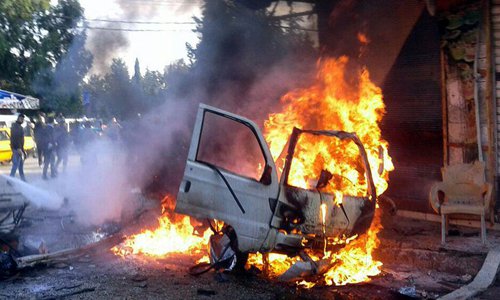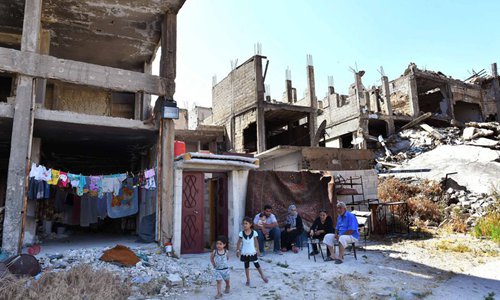HOME >> WORLD
UN official highlights dire humanitarian situation in NW Syria
Source:Xinhua Published: 2019/9/20 12:12:00

A burning vehicle is seen at the site where a car bomb exploded in Latakia, Syria, on Jan. 22, 2019. (Xinhua)
The humanitarian situation in northwest Syria remains alarming despite a unilateral cease-fire in Idlib, Ursula Mueller, UN assistant secretary-general for humanitarian affairs, said Thursday.
There is a decline in fighting since Russia announced a unilateral cease-fire in the Idlib "de-escalation area" on Aug. 30, which the Syrian government later confirmed, Mueller told the Security Council.
However, worrying signs of insecurity are present, and the humanitarian situation remains alarming, she said in a briefing.
Ground forces continued to exchange shelling in southern Idlib and eastern Latakia, and airstrikes were reported in central and northern Idlib over the past week. At the same time, listed terrorist group Hayat Tahrir al-Sham and other non-state armed groups continued to harass, intimidate and coerce civilians, including medical workers, said Mueller.
On the humanitarian side, an estimated 400,000 people fled their homes in northwest Syria from May to August, she said.
Many of those people have been displaced multiple times, both before and during the current military escalation that began in late April. These displacements follow familiar patterns, with civilians largely moving northward, away from conflict-affected areas, to already densely populated areas in northern Idlib, she said.

The Shtaiwi family sits outside their house amid the rubbles in the Wadi al-Sayeh street in the central city of Homs, Syria, May 29, 2019. (Xinhua/Ammar Safarjalani)
In addition to the needs of those displaced, host communities are becoming increasingly strained, leading to additional demands on overstretched humanitarian assistance. Needs in these areas are considerable across all sectors: food and non-food, water and sanitation, health, education, and protection, said Mueller, who is also the deputy emergency relief coordinator of the United Nations.
Given the current situation, it is critical that the much-needed respite for civilians continue, unimpeded humanitarian access be facilitated to all civilians in need, and the protected status of civilian infrastructure be respected, she said.
Following months of intensive fighting, the outlook in northwest Syria remains uncertain as winter is coming, she warned.
Humanitarian organizations are already planning how to help people in need before temperatures drop and inclement weather arrives. Humanitarians estimate that an additional 68.4 million US dollars is required to address expected winterization, shelter and non-food item needs, said Mueller.
She added that humanitarian efforts to assist civilians in need across northwest Syria depend on more than just financial support. Humanitarian access is needed as the people in Idlib are reached exclusively through the cross-border operation.
In recent weeks, she said, the fragile cease-fire in northwest Syria has brought into focus an outlook that, for the Security Council, should be all too familiar: Further fighting will endanger and displace thousands of civilians; further displacement will create even more needs; further needs will stretch humanitarians that are already at their limit.
"The world is watching, in hopes that a more humane outlook for Syria will be created, one where civilians are safe, needs are addressed, and humanitarians are protected," she told the council.
Apart from the urgent humanitarian situation, Syrians across the country are suffering from food insecurity and the threat of unexploded ordnance, said Mueller.
Despite an increase in food production, food prices have gradually increased nationwide over the last 12 to 14 months, just as the value of their currency has gone down, she said.
Such conditions only heighten the importance of ongoing efforts to support the more than 6.5 million people estimated to need food and livelihoods support. On a monthly basis, humanitarian organizations deliver food assistance to 4.4 million people in need, she said.
Civilians in Syria face a chronic danger of unexploded ordnance, even in areas where fighting has subsided. More than 10 million people in Syria are estimated to live in contaminated areas, she said. "The indiscriminate nature of unexploded ordnance makes them a shared challenge. I support standing calls for all parties to the conflict to allow clearance of unexploded ordnance, to safely conduct risk education efforts, and to ensure the respect and safety for humanitarian staff conducting the clearance activities."
Posted in: MID-EAST